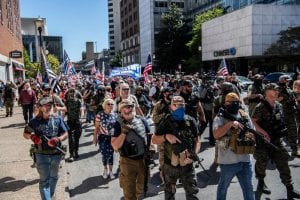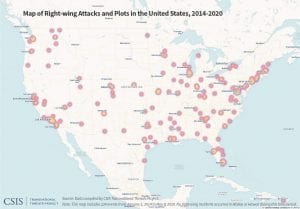Political Violence and the 2020 Election
October 13, 2020 by
 Journaling Task: Reflecting On Political Violence
Journaling Task: Reflecting On Political Violence
On October 8, the FBI announced that it had thwarted a plot led by a right-wing militia to kidnap and potentially assassinate Governor Gretchen Whitmer, D-Mich.1 Whitmer, in an op-ed published in the Washington Post, laid some of the blame at the feet of President Donald Trump, writing:
I’m not going to waste my time arguing with the president. But I will always hold him accountable. Because when our leaders speak, their words carry weight. When our leaders encourage domestic terrorists, they legitimize their actions. When they stoke and contribute to hate speech, they are complicit. And when a sitting president stands on a national stage refusing to condemn white supremacists and hate groups, as President Trump did when he told the Proud Boys to “stand back and stand by” during the first presidential debate, he is complicit. Hate groups heard the president’s words not as a rebuke, but as a rallying cry. As a call to action.2
In an interview about the foiled kidnapping plot, Representative Debbie Dingell, D-Mich., said, “I hope that this got a lot of people’s attention and we can all take a deep breath and really think about how fear and division is dividing this country and stop being pitted against each other.”3
Even before news of the plot broke, some pundits, political leaders, and citizens had expressed concern about the potential for violence before, during, and/or immediately after the 2020 election. One cause for these worries is that a high number of mail-in ballots could make the outcome of the election uncertain, with the results on Election Day potentially differing from the final results.4 Some experts have predicted violence if President Trump loses and refuses to leave office.5 Others, such as Howard Simon, the former executive director of the American Civil Liberties Union of Florida, are concerned about the use of violence prior to the election as a tool to disrupt or discredit voting.6
Election Violence in Context
In the United States, violence connected to elections is not new, but many believed it to be a thing of the past. For much of the 19th and 20th centuries, white supremacy groups, local and state officials, and law enforcement officials ensured that Black Americans did not have the right to vote. In addition to restrictions such as poll taxes, literacy tests, and grandfather clauses,7 violence and intimidation were used to keep Black people from voting. For example, in 1873 in Colfax, Louisiana, 150 Ku Klux Klan members and former Confederate soldiers killed between 60 and 150 Black men (accounts differ) who were attempting to participate in the political process.8
Primary Source: “To the Colored Men of Voting Age in the Southern States,” a pamphlet designed to help Black Americans vote
Some historians see echoes of another political movement, the Know-Nothings, in today’s politics. The Know-Nothings, formally called the American Party or the Native American Party, was an anti-immigrant, nativist movement in the middle of the 19th century.9 During the election of 1856, members and supporters of the party formed street gangs to intimidate voters in Baltimore and elsewhere.10 Similarly, there were riots and clashes between supporters of the Whig Party and the Democratic Party during the election of 1834.11

The 2020 Election
The Center for Strategic and International Studies has tracked political violence and terrorism in the United States for more than 20 years. According to its analysis, 2016, 2017, and 2019 saw the most instances of right-wing violence since 1995, the year of the Oklahoma City bombing. The report concludes that the 2020 election has the potential to make matters worse.12 This year has seen political violence in cities such as Portland, Oregon, where a left-wing antifa supporter shot and killed a member of Patriot Prayer, a pro-Trump group. And a bipartisan group of former elected officials and academics (none of whom support President Trump) recently discussed multiple scenarios in which violence follows the 2020 election. Rosa Brooks, a professor of law and policy at Georgetown University and a former Defense Department official who helped organize the group, said, “The law is essentially … it’s almost helpless against a president who’s willing to ignore it.”13
In the midst of a widening partisan divide,14 heightened fear and anger toward members of the opposite party,15 and rhetoric from political leaders that stokes the fires,16 Americans’ views toward political violence are changing, with more people finding violence acceptable under certain circumstances. A research team of fellows from the Hoover Institution, New America, and other institutions wrote in Politico Magazine, “Our research, which we’re reporting here for the first time, shows an upswing in the past few months in the number of Americans—both Democrats and Republicans—who said they think violence would be justified if their side loses the upcoming presidential election.”17 According to the researchers, “44 percent of Republicans and 41 percent of Democrats said there would be at least ‘a little’ justification for violence if the other party’s nominee wins the election.” Those figures increased from June, when the numbers were 35 and 37 percent, respectively.18
Discussion Questions
- What have you heard or read about political violence in the news and on social media?
- Are any of your friends or family members concerned about violence during this election? What have they been saying?
- Are you worried about political violence in your community? Why or why not?
- How should citizens respond if there is violence in the wake of the 2020 election?
- What other concerns do you have about this election?
Further Reading
The first of these readings offers historical context for election-related violence in the United States. The others relate to current trends and attitudes toward violence, partisanship, and the election.
- The New Yorker: “Our Long, Forgotten History of Election-Related Violence”
- Carnegie Endowment Report: “Should America be Worried about Political Violence? And What Can We Do to Prevent It?
- Politico Magazine: “Americans Increasingly Believe Violence is Justified if the Other Side Wins”
- New York Magazine: “Americans are Becoming More Open to Post-Election Violence”
Featured Image Credit: Alex Lourie/Redux
[1] BBC: https://www.bbc.com/news/world-us-canada-54482846
[2] Washington Post: https://www.washingtonpost.com/opinions/2020/10/09/gretchen-whitmer-hold-trump-accountable/
[3] ABC17News: https://abc17news.com/politics/national-politics/2020/10/09/dingell-hopes-plot-against-whitmer-will-bring-attention-to-threat-of-political-extremism-2/
[4] New York Magazine: https://nymag.com/intelligencer/2020/10/americans-increasingly-open-post-election-violence-study.html
[5] Newsweek: https://www.newsweek.com/bipartisan-group-predicts-violence-if-trump-loses-election-refuses-leave-white-house-1520561
[6] Tampa Bay Times: https://www.tampabay.com/opinion/2020/09/08/be-prepared-for-threat-of-election-disruption-through-violence-column/
[7] Constitutional Rights Foundation: https://www.crf-usa.org/brown-v-board-50th-anniversary/race-and-voting.html
[8] Smithsonian Magazine: https://www.smithsonianmag.com/smart-news/1873-colfax-massacre-crippled-reconstruction-180958746/
[9] Smithsonian Magazine: https://www.smithsonianmag.com/history/immigrants-conspiracies-and-secret-society-launched-american-nativism-180961915/
[10] The New Yorker: https://www.newyorker.com/magazine/2020/09/14/our-long-forgotten-history-of-election-related-violence
[11] Ibid.
[12] Center for Strategic and International Studies: https://www.csis.org/analysis/escalating-terrorism-problem-united-states
[13] Newsweek: https://www.newsweek.com/bipartisan-group-predicts-violence-if-trump-loses-election-refuses-leave-white-house-1520561
[14] Pew Research Center: https://www.pewresearch.org/politics/2020/09/02/in-views-of-u-s-democracy-widening-partisan-divides-over-freedom-to-peacefully-protest/
[15] Pew Research Center: https://www.pewresearch.org/politics/2016/06/22/partisanship-and-political-animosity-in-2016/
[16] Washington Post: https://www.washingtonpost.com/outlook/america-political-violence-risk/2020/09/11/be924628-f388-11ea-999c-67ff7bf6a9d2_story.html
[17] Politico: https://www.politico.com/news/magazine/2020/10/01/political-violence-424157
[18] Ibid.







